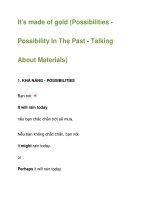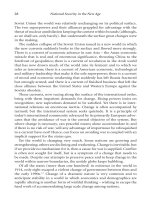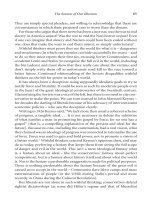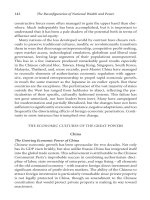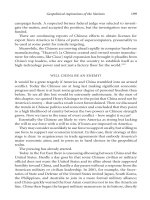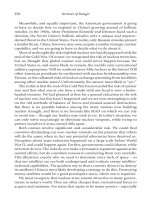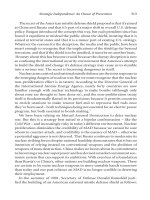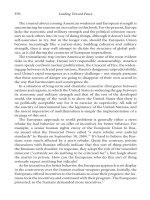survey on graduating english students’ level of readiness to participate in the job market
Bạn đang xem bản rút gọn của tài liệu. Xem và tải ngay bản đầy đủ của tài liệu tại đây (533.91 KB, 61 trang )
MINISTRY OF EDUCATION & TRAINING
CAN THO UNIVERSITY
SCHOOL OF SOCIAL SCIENCES AND HUMANITIES
GRADUATION THESIS
ENGLISH TRANSLATION AND INTERPRETING
SURVEY ON GRADUATING ENGLISH STUDENTS’
LEVEL OF READINESS TO
PARTICIPATE IN THE JOB MARKET
SUPERVISOR
TRƯƠNG THỊ NGỌC ĐIỆP
Cantho, May 2013
STUDENT
MAI BÁ ANH TRIẾT
CODE: 7096546
CLASS: NN09Z8A1
STATEMENT OF ORIGINALITY
I certify that this work has not been submitted in the whole or in part to the
university or to any other educational institutions for marking and assessment
either previously or concurrently. I also declare that the intellectual content of this
thesis is the product of my own work, except to the extent that assistance from
others in the project's design and conception or in style, presentation and linguistic
expression is acknowledged.
Mai Bá Anh Triết
May, 2013
i
ACKNOWLEDGEMENT
This study has been completed with the help and support of many people.
Therefore, I am thankful to all of them.
First and foremost, I would like to express my special thanks to my
supervisor, Mrs. Truong Thi Ngoc Diep who gave me a chance to conduct
this thesis as part of the school level scientific research “Khảo sát mức độ
chuẩn bị tham gia thị trường lao động của sinh viên: Góc nhìn của sinh
viên năm cuối trường Đại học Cần Thơ”. Mrs. Diep has devoted a lot of
her valuable time and energy to correct my thesis. Without her dedicated
support and patience to me, I would have had difficulties in completing the
thesis.
Next, I would like to send my deep gratitude to Mr. Chau Thien Hiep, who
instructed data analysis with Statistic Package for Social Sciences Software to me,
and gave me valuable suggestions on my thesis.
I also would like to express my appreciation to Mr. Nguyen Hai Quan, and
Ms. Luu Bich Ngoc for their valuable comments on how to write an
academic research study. Working with them, I have learnt precious
experiences in conducting research.
Then, I would like to show my appreciation to my friends, who helped me to
collect and input data.
Finally, my thanks are to all participants of thesis. Without their assistance,
my study could not have been finished.
ii
TABLE OF CONTENTS
STATEMENT OF ORIGINALITY ....................................................................i
ACKNOWLEDGEMENT ..................................................................................ii
TABLE OF CONTENTS ...................................................................................iii
LIST OF CHARTS AND FIGURES ..................................................................v
TÓM LƯỢC .......................................................................................................vi
ABSTRACT.......................................................................................................vii
CHAPTER 1: INTRODUCTION .......................................................................1
1.1 Rationale....................................................................................................1
1.2 Research objectives and significance..........................................................4
1.3 Thesis organization ....................................................................................4
CHAPTER 2: LITERATURE REVIEW ...........................................................6
2.1 Graduating students and the job market .....................................................6
2.2 The three goals of college education and their importance..........................7
2.2.1 Knowledge......................................................................................7
2.2.2 Soft skills ........................................................................................8
2.2.3 Personal values..............................................................................14
2.3 Studies on students’ readiness to participate in the job market..................18
2.4 Research questions ...................................................................................21
2.5 Hypotheses............................................................................................... 21
CHAPTER 3: RESEARCH METHODOLOGY .............................................22
3.1 Research design .......................................................................................22
3.2 Participants .............................................................................................. 22
3.3 Materials ..................................................................................................23
3.4 Data collection .........................................................................................25
3.5 Data analysis ............................................................................................ 25
CHAPTER 4: RESULTS, DISCUSSION AND CONCLUSION ....................26
4.1. Research results.......................................................................................26
4.1.1 Responses to the closed-ended questions.......................................26
4.1.2 Responses to the open-ended questions .........................................31
iii
4.2. Research discussion.................................................................................33
4.3. Conclusion .............................................................................................. 36
CHAPTER 5: LIMITATIONS AND RECOMMENDATION........................37
5.1 Limitations............................................................................................... 37
5.2 Recommendation .....................................................................................37
5.3 Directions for further research..................................................................38
REFERENCES ..................................................................................................39
APPENDICES ...................................................................................................43
APPENDIX A ............................................................................................... 43
APPENDIX B ............................................................................................... 47
APPENDIX C ............................................................................................... 51
iv
LIST OF CHARTS AND TABLES
Chart 1: Three groups of participants..................................................................23
Table 1: Essential soft skills for students ................................................................9
Table 2: Overall mean comparison of 3 aspects Knowledge, Skills and Values..... 26
Table 3: Overall mean comparison of specific skills ............................................. 27
Table 4: Mean comparison between male and female students’ perceptions
regarding their knowledge, skills, and values......................................... 27
Table 5: Mean comparison between male and female students’ perceptions
regarding their specific skills ................................................................. 28
Table 6: Mean comparison according to majors English Translation and
Interpreting (ETI), English Studies (ES) and English Education (EE) their
knowledge, skills, and values .................................................................. 29
Table 7: Mean comparison according to majors English Translation and
Interpreting (ETI), English Studies (ES) and English Education (EE) their
specific skills........................................................................................... 30
Table 8: Students’ likes, dislikes and suggestions ................................................. 31
v
TÓM LƯỢC
Nghiên cứu này nhằm khảo sát mức độ chuẩn bị tham gia thị trường lao
động qua góc nhìn của sinh viên sắp tốt nghiệp chuyên ngành tiếng Anh tại trường
Đại học Cần Thơ. Nghiên cứu đã sử dụng chủ yếu dữ liệu định lượng thu thập từ
bảng câu hỏi đóng và mở. 90 sinh viên thuộc 3 chuyên ngành Biên Phiên Dịch
tiếng Anh, Ngôn Ngữ Anh và Sư Phạm tiếng Anh tham gia nghiên cứu. Phần mềm
thống kê xã hội học SPSS được dùng để phân tích dữ liệu. Kết quả nghiên cứu cho
thấy sinh viên đã có sự chuẩn bị để tham gia vào thị trường lao động nhưng mức độ
chuẩn bị vẫn chưa phải lài tốt nhất, cần phải được hỗ trợ rèn luyện thêm. Cụ thể,
sinh viên Biên Phiên Dịch tự tin hơn các sinh viên của 2 ngành còn lại, đặc biệt ở
kỹ năng xin việc. Hi vọng kết quả nghiên cứu này sẽ giúp nhà trường và giáo viên
hiểu rõ hơn cảm nhận của sinh viên về mức độ sẵn sàng tham gia thị trường lao
động. Nghiên cứu này còn đưa ra một số đề nghị điều chỉnh chương trình đào tạo,
nhằm tăng cường khả năng áp dụng vào thực tế những kiến thức và kỹ năng học
được.
vi
ABSTRACT
This study aims to investigate the level of preparation for the labor market
from the perspective of graduating English students at Can Tho University. This
study used both quantitative and qualitative data from a questionnaire consisting of
51 Likert-scale items and 4 open-ended items. Ninety participants from three
English majors (English Translation and Interpreting, English Studies and English
Education) were recruited. Frequencies, T-Tests, and ANOVA’s were used to
analyze the data. In general, results showed that the students were not very wellprepared for the job market. However, English Translation and Interpreting
students were the most confident among the three groups, especially in their jobseeking skills. The research results should give insights into students' perceptions
on their readiness for the job market. This survey suggests an adjustment to the
training program so as to be more practical, in its application of knowledge and
skills in the current situation.
vii
CHAPTER 1: INTRODUCTION
This chapter describes (1) the rationale of the current study, (2) research
objectives and significance, and (3) thesis organization.
1.1 Rationale
All the activities of an institution of higher education are geared to one main
objective: to train and provide the high-quality workforce for society (Higdon,
2004; Strause, K et al, 2006; Woodruff, 2012). Hence, students need to equip
themselves with adequate knowledge, skills and ethics to go to work in the most
efficient and professional way. The work of assessing the readiness of university
graduates to join the market is an topic that has been widely discussed around the
world from many different perspectives and levels (Atfield & Purcell, 2012;
Cavanagh et al, 2006; Quan, Tran, & Pham, 2011).
Cavanagh et al (2006) researched the level of preparedness to participate in
the labor force of college and university students through the evaluation of
employers from 500 large companies in the United States. The authors confirmed
that the higher education institution took the major responsibility for equipping
students with the necessary knowledge and skills. However, the result of the
research showed that the university had just equipped students with average range
of knowledge and skills to apply in the work place. These institutions had not
given a timely response to the requirements of the employers given the current
growth of society.
Another research report from the perspective of managing directors by
Dennis (2011) showed that the school needed to improve training the appropriate
skills for students to be able to meet the requirements of the workplace. Only 17%
of the directors said that young people in the United States had fully prepared to
participate in the competitive world. Similarly, the report of an educational
1
evaluation agency in California (Sommerville, 2012) showed that the state's
community colleges did not meet the requirements of basic skills for students to be
successful at work.
From the students’ perspective, those who joined the research by Gardner
(2000) said that may be they were not ready to find a good job with high salary
because sixty percent of them admitted not having appropriate learning methods.
College graduates could not find a job immediately or got fired soon due to their
lack of communication skills and teamwork skills.
Vocational consultants commented that Vietnamese students’ soft skills
were very weak (Lao Dong, 2008). Many of them lacked presentation skills. "This
is the weakest skill of students nowadays. They do not know how to present the
ideas coherently and clearly to other people, especially in front of a crowd or
employers” (Lao Dong, 2008). According to this article, soft skills of young
people just met about 10% of work demands. Therefore, university education
should pay more attention to skills, and these skills should be included in some
courses.
In the workshop “Solutions to improving the quality of human resources
training at university", many employers agreed that 94% of the students, after
graduation, need to be retrained in the workplace (Thanh Nien Online, 2011). The
training content is not only professional knowledge but also the work attitude,
work ethics, work discipline and basic skills in addressing and solving practical
problems of working. The reasons why students could not find a job immediately
or got fired very soon were due to their lack of abilities, no clear orientation, or
lack of soft skills to work effectively. However, up to now no research report
about students’ opinion on this issue in CTU has been found.
The results of the survey “Career trend of students in English Department,
School of Education, CTU” (Trương & Hồ, 2003) revealed that the job hunting of
2
college graduates mainly depended on the knowledge and skills preparation.
Sixty-seven percent of the students took a long time to get a job. Most of them had
to attend more classes in computer science, professional training courses, and
foreign languages especially English. Another study about college graduates of
School of Education at Can Tho University (CTU) showed that students were very
confused with group work and self study skills. They lacked critical thinking and
always depended on their teachers. Moreover, “being passive, inflexible in solving
problems” was the idea remark of some employers to the students (Nguyen et al,
2009). Therefore, forming study habits, good thinking and life skills in students
are really urgent needs that every educator has to care about.
CanTho University is a main institution of undergraduate and post-graduate
training, with the mission of providing the professional human resources for the
socio-economic development of the areas and the whole country. To meet the
social need annually, the English Department of the School of Social Sciences and
Humanities and the School of Education train hundreds of students. They are all
going to join the workforce with enthusiasm. However, some queries have been
raised. For example, are the seniors ready to join the labor force? Are they wellprepared for employment? Do they need any support? Yet the appropriate answers
for these question have not been found in any research. Consequently, the career
preparation of seniors studying at CTU has aroused my interest. From my own
experience, as a senior of the School of Social Sciences and Humanities, CTU, I
have noticed the great influence of knowledge, soft skills, and values on my parttime job. Based on the theoretical background on the impact of these factors on the
employment opportunities and the real demands of the job market, the current
study is conducted to investigate the readiness to join the workforce of English
majored seniors of the School of Education and the School of Social Sciences and
Humanities at CTU. While most of the studies to date have focused on the
assessment of students’ job preparation by the employers,the present study looks
at the students’ perceptions about what they need to prepare for job in the future.
3
1.2 Research objectives and significance
This study aims to investigate the level of preparation of final-year students
majoring in English at the School of Education and the School of Social Sciences
and Humanities at CTU in three aspects: knowledge, skills and personal values.
Students are also expected to have a review on their learning process and evaluate
their development at CTU when they respond to the survey. Thereby, they can
recognize their strengths and weaknesses in preparing themselves to be successful
in the future work. Based on the research findings, I would like to offer some
solutions and recommendations to school to prepare the students for meeting the
demands of the labor market.
1.3 Thesis organization
The thesis consists of five chapters: (1) Introduction, (2) Literature Review, (3)
Research Methodology, (4) Results, Discussion, and Conclusion, (5) Limitations,
and Recommendations.
Chapter One presents the problems of the university graduates in the job
market related to their preparation to work in the context of the world and
Vietnam. The background information and reasons to conduct the thesis are also
mentioned. Then, research questions, research objectives and significance are
introduced. The organization of the thesis is included in the last part of the chapter.
Chapter Two - Literature Review provides definition of terms used in the
thesis and reviews the previous related studies.
Chapter Three concentrates on research methodology. It describes the
research designs, participants, and research procedure used in this thesis. A
detailed description of the instruments and data collection is also presented.
4
Chapter Four shows the results of the questionnaire responses analyzed by
SPSS. The chapter summarizes the main results of the thesis and gives a deep
discussion about the results in comparison with the results of previous studies. It
also emphasizes the soft skills and values which need to be paid attention to.
In Chapter Five, the limitations of the study and certain recommendations
for further research are finally included.
5
CHAPTER 2: LITERATURE REVIEW
This chapter reviews the previous projects investigating the topic of graduating
students’ readiness for the job market in terms of the three aspects: knowledge,
skills and values. It includes (1) an overview of graduating students and the job
competition, (2) the three aspects: knowledge, skills and personal values, (3)
studies on students’ readiness to participate in the job market (4) research
questions, and (5) hypothesis of the thesis.
2.1 Graduating students and the job market
The transition from university to the job market can be a period either stressful or
exciting, to which some students can make better adjustments than others. Fulltime work can be a shocking experience to those familiar with a leisurely lecture
timetable. Working in an office or any organization for eight hours a day takes
some time to get used to. However, the first barrier for new graduates to cross is
finding a job. Towards the end of academic life, seniors start to think about job
hunting. Some students are hired before finishing their degree and have to juggle
time between work and studying. Other students may opt to take a break upon
degree completion and may spend this time traveling before deciding on their
career. Another group may complete their degree and start looking for a job right
away.
In reality, many university graduates do not walk into their dream job, but
instead have to start from the bottom, working their way up the ladder in a
company or several companies, and often starting with a low salary. According to
the article “Employment of graduates and the demand of the job market in HCMC
2012-2015” by Tran (2012), approximately 80% of graduates were employed and
the remaining (20%) could not find a job. The survey also revealed that only about
50% students who got jobs lived with suitable jobs and had opportunities to
6
develop their career, and the other 50% worked in non-professional field with low
income and lack of stability.
2.2 The three goals of college education and their importance
To develop a course in a higher education institution, setting goals is the first and
most important step (Bloom et al, 1994). The researchers claim that once goals are
stated, school can connect the curriculum, instruction, and assessment to them.
Assessment with course goals can be aligned by grouping them into three broad
categories: knowledge-based goals, skills-based goals, and affective goals, among
which affective goals include values, attitudes, and interests.
2.2.1 Knowledge
In Oxford dictionary (the 8th edition, 2013), knowledge is defined as the
information, understanding and skills that students gain through education or
experience. In Chapter Five “Think and Grow Rich”, Napoleon Hill (1938)
divided knowledge into two categories: general knowledge and specialized
knowledge.
(1) General knowledge
General knowledge or common knowledge is knowledge of facts about a
lot of different subjects (Oxford dictionary). It is general information in certain
areas such as diplomacy, management, teaching, love, marriage, and so on. Every
field has its certain knowledge and can be learned from many sources such as from
school, book, television or the Internet. General knowledge is not only the
fundamental knowledge but also the important base of life and career.
(2) Specialized knowledge
Specialized knowledge is in-depth knowledge about a particular subject.
Specialized knowledge is traditionally seen as knowledge that has undergone a
7
formal rationalization and that is systematic, codified and generalized (French,
2007). French believes that professional knowledge raises the awareness about the
field, and it provides a theory based on practice relevant to student’s professional
fields and benefits them in increasing their understanding of their future work. If
the general knowledge can be learned from many sources, even by self-learning
through finding information in books, television, or the Internet, specialized
knowledge can only be transferred through schools. Students, especially seniors,
have spend 3 to 4 years in the college to foster their professional knowledge for
the future career. Based on their in-depth specialized knowledge, students can
develop appropriate skills and solve problems in their career life. For example, a
teacher should possess the qualifications and professional knowledge required to
ensure a successful performance in class such as general pedagogical knowledge,
subject knowledge and teaching methodology (Maria, 2011). They can also use
relevant scientific knowledge.
2.2.2 Soft skills
In Oxford dictionary (2013), “soft skills” or “interpersonal skills” is defined as
personal attributes that enable someone to interact effectively and harmoniously
with others. The roles of soft skills appear in every aspect of life. They show one’s
lifestyle and real life experience accumulation.
The issue of soft skills has raised a special attention in many countries
around the world, especially in developed countries. The book “Employability
skills for the future" of the Business Council of Australia (BCA) and the
Australian Chamber of Commerce and Industry (ACCI) (2002) defines soft skills
as the skills required for students not only to find a job but also to improve of their
abilities and contribute to the development of the organization. According to the
book, there are eight skills: communication, teamwork, problem-solving, initiative
and enterprise, planning and organizing, self-management, learning, and
technology. In the United Kingdom, the government is interested in developing
strong and competitive human resources. The Qualification and Curriculum
8
Authority (2009) has also come up with a list of important skills: application of
number, communication, improving one’s own learning and performance,
information and communication technology, problem solving, and working with
others.
Following the article “What Do Employers Really Want? Top Skills and
Values Employers Seek from Job-Seekers” by Hansen, R. and Hansen, K. (2008),
a list of important skills have been synthesized and proposed for participants in the
current study.
Table 1: Essential soft skills for students
Skill
1
Communication skill
Definition
The ability to listen, read, write, and speak
effectively
2
Teamwork skill
The ability to work with others in a professional
manner while attempting to achieve a common goal
3
Problem-solving skill
The ability to find solutions to problems using
creativity, reasoning, and past experiences along
with the available information and resources
4
Organizational skills
The ability to design, plan, organize, and implement
projects and tasks within an allotted timeframe
5
6
English communication
The ability to listen, read, write, and speak
skills
effectively in English
Job interview skills
Including how to effectively write cover letter,
curriculum vitae, prepare the outlook and answer
interview questions.
7
8
Information searching
The ability to effectively search information sources
skills
using a variety of information tools available.
Computer Literacy
Basic understanding of computer hardware and
software, especially word processing, spreadsheets,
and email.
9
(1) Communication skills
In today's society, communication is really an important aspect of human
life. The higher civilization of society students live in, the higher need of
communication they have. Communication happens through many channels:
interpersonal communication skills (verbal and non-verbal), listening skills,
reading skills, writing skills, questioning skills, and understanding skills. Business
managers with good verbal, non-verbal and written communication skills help
facilitate the sharing of information among employees within a company for its
commercial benefit.
This research focuses on the interpersonal communication skills.
Interpersonal communication is the process by which students exchange
information, feelings, and meaning through verbal and non-verbal messages: it is
face-to-face
communication
(skillsyouneed.com).
The process of verbal
communication is aided with clarity of speech, remaining calm and focused, being
polite and etiquette. However, interpersonal communication is not just about what
is actually said - the language used - but how it is said and the non-verbal
messages sent through tone of voice, facial expressions, gestures and body
language. Therefore, communication skills are extremely important factors to
demonstrate the confidence, the dynamics of the students and also the key to
success in life.
(2) Teamwork skills
In a report of BCA and ACCI (2002), the essential elements of teamwork
identified by employers were concerned with employees’ of different age, gender,
race, religion or political view; working as an individual and as a member of a
team; knowing how to define a role as part of a team; applying teamwork to
situations; identifying the strengths of team members; and coaching, mentoring
and giving feedback. Crebet et al (2011) also defined teamwork as the mix of
interactive, interpersonal, problem-solving and communication skills needed by a
10
group of students working on a common task, in complementary roles, and
towards a common goal, whose outcomes are greater than those possible by any
person working independently.
(3) Problem-solving
The Concise Oxford dictionary (1995) defines a problem as “something
hard to understand or accomplish or deal with” and “a doubtful or difficult matter
requiring a solution”. To solve a problem efficiently and in a timely way, we need
skills to identify the problem, structure the problem, seek a solution, and make a
decision.
Decision making is the act of choosing between two or more courses of
action by searching for more information, getting others’ recommendations, taking
a vote or even tossing a coin. On skillsyouneed.com, there are six steps to make a
good decision: (1) listing all possible options; (2) setting a time scale and deciding
who is responsible for the decision; (3) gathering information; (4) weighing up the
risks involved; (5) deciding on values, or in other words what is important; (6)
weighing up the pros and cons of each course of action and (7) making the
decision.
(4) Organizational skills
Organizational skills are essential in work or study. In the business world,
organizational skills are invaluable to employers. Organizational skills include
prioritization, time management and stress management skills (skillsyouneed.com)
(a) Prioritization
Learning to eliminate unnecessary tasks and decide which items on the todo list is the most important is a helpful organizational skill, because it forces
students to tackle high-priority tasks before less important ones. They can
accomplish tasks with earlier deadlines or greater effects on time and in a
11
thoughtful manner. If a person does not prioritize, he/she may do small tasks first
because they take less time, but postpone big jobs until the last minute, causing
him/her to do a substandard job on them (skillsyouneed.com).
(b) Time management
Time management is the ability to manage time using a range of skills,
tools (e.g, schedule, file cabinets, paper trays and daily planners) and techniques to
effectively
manage
tasks,
projects,
goals
and
schedules
(managementskillsadvisor.com). Students will have a hard time developing their
tasks or accomplishing projects as well as they would like to without efficient and
effective time management skills.
(c) Stress management skills
In a study on stress management by Reddy (2008), stress management
comes down to how students organize their thoughts and their inner life in reaction
to events, circumstances and others in their outer life. Each person has his or her
own way to reduce stress. By learning to organize our thoughts and reduce stress,
the rest of the organizational tasks will be much more easily accomplished. To be
successful, students have to know how to reduce the effect of stress in their life.
(5) English communication skills
In “The Globalization of English Report: Globalization Accelerates Need
for Business English Communication Skills” by Pearson Company (2010), it
remains clear that the “flattening” of global business increasingly mandates
English competency as a crucial skill for the workplace. A growing number of
global workers must communicate in English—both within and outside their
company—on a regular basis. The report reveals that ninety-two per cent of global
employees say English is required or important for their job, and this is true at all
levels of the organization all over the world.
12
(6) Job interview skills
This is an essential skill for students, especially seniors and new graduates.
After graduation, many students have realized that finding a suitable job in a
company is not easy at all, even with excellent university degree. Definitely, it is
not caused by the student’s ability shortage but because he/she lacks job interview
skills. Job interview skill is an efficient feature for a job applicant to be chosen for
the job. Job interview skill could be developed and characterized so as to maintain
a steady success during the job interview. Job interview needs a good preparation.
Information about company, position and field a person applies to are something a
candidate has to know. In addition, knowing how to have a pleasing appearance,
how to answer questions from interviewers and how to express emotion as
personality during the process are important. At last, writing a well-organized CV
is also a skill students need to learn. Although job interview skills are very
essential for students to earn a job, no related study about the importance of these
skills have been found.
(7) Information-searching skills
Information searching skills might not be the most important skills, but it is
essential as it will help us save time and effort to select a good source. When an
issue occurs in study or in life that students need to understand or solve, they have
to seek information about that issue. There are many ways to get the information
we need such as asking teachers and friends, reading books or watching television.
Besides, with the advancement of science and technology, the Internet has become
a huge source of knowledge. By using Google, students can access different
sources of information in a fast and convenient way. However, there are widely
unreliable and incorrect sources on the Internet. Knowing how to identify the
reliability of the information is also an important skill since problems from
choosing bad sources can happen without it (Mildred F. Sawyer Library - Suffork
University).
13
(8) Computer literacy
Computer literacy refers to the ability to use computer programs in an
effective manner. The BCA and ACCI (2002) suggested that many enterprises
now require some basic understanding of computer hardware and software (e.g;
Microsoft Word, Excel, Power Point, Photoshop, etc) especially word processing,
spreadsheets, and email. Computer skills can be considered as the most basic skills
a modern worker needs to possess as companies have started to depend upon
computerized technology to get work done.
In summary, these are essential skills for job vacancies which employers
are seeking. Today's service economy and the ascendance of work teams in large
organizations put a new premium on interpersonal and relationship-building skills.
Kocon (2009), a Portland-based human resources expert, says, “Employers also
want students who are agile, adaptable and creative at solving problems." Together
with general knowledge and expertise, soft skills are also an important factor that
can affect recruitment decision of an enterprise. In an interview, employers might
give many unrelated questions in order to check the interviewee’s interpersonal
skills. There will be no accurate answers to that type of question. However, the
candidate is supposed to convince employers to believe in his/her answers. In
Vietnam, the education system has not really focused on or paid proper attention
to the importance of soft skills. Therefore, they were reviewed in this study in
order to create a base for my questionnaire.
2.2.3 Personal values
According to BCA and ACCI (2002), personal values were the term used to
describe a set of non skill-based behaviors and attitudes that employers felt were
as important as the employability skills and other technical or job specific skills.
Values indicate a strong personal preference for what is important to a person.
Understanding values will help people to focus on career objectives that are
important to both employees and employers, contributing to greater productivity
14
and job satisfaction. They also indicate essential personal values including loyalty,
commitment, honesty and integrity, enthusiasm, reliability, personal presentation,
commonsense, positive self-esteem, sense of humor, balance attitude to work and
home life, ability to deal with pressure, motivation, and adaptability. In this study,
from various sources, especially following the article “What Do Employers Really
Want ? Top Skills and Values Employers Seek from Job-Seekers” by Hansen, R.
and Hansen, K. (2008), I have synthesized and proposed a list of values which are
important for students:
(1) Strong professional ethics
In “Professional Ethics and Morality”, Sirswal (2010) claims that
“professional ethics is partly comprised of what a professional should or should
not do in the workplace”. It also encompasses a much greater part of the
professional’s life. If a professional is to have ethics, then that person needs to
adopt that conduct in all of his dealings”. Every profession has its own codes to
practice by their professionals. According to Ms. Trinh Hong Nguyet (2005), vice
president and also the secretary general of Vietnam Association of Certified Public
Accountants (VACPA), professional ethics are the valuable intangible assets of
the students to be successful in the market nowadays. Professional ethics would
bring benefits for both individual employees and companies. In a study by Kotter
and Heskett (2011) , companies with high ethical standards showed to be able to
improve their income up to 68.2% (compared to rival companies with ethical
standards achieved on average 36%), and increase the value of shares on the stock
Securities by 90.1% and net income to 75.6%.
(2) Integrity
According to Oxford dictionary (2013), integrity is the quality of being
honest and having strong moral principles. Good relationships are built on trust.
Employers want to know if they can trust what their employees say and do.
Successful businesses work to gain the trust of customers. It is the responsibility of
15
each person to use their own individual sense of moral and ethical behavior when
working with and serving others within the scope of their job (Loretto, about.com
guide).
(3) Adaptability
Adaptability is the ability to have openness to new ideas and concepts, to
working independently or as part of a team, and to carrying out multiple tasks or
projects (Hansen, R. & Hansen, K., 2008). Employers seek employees who are
adaptable and maintain flexibility in completing tasks in an ever-changing
workplace. Potential applicants are students who can demonstrate their
adaptability to changing circumstances and environments and accept new ideas
and concepts. Being open to change and improvements provides not only an
opportunity to complete work assignments in a more efficient manner but also
offer additional benefits to the corporation, the customer.
(4) Passion
Employers seek job-hunters who love what they do and will keep at it until
they solve the problem and get the job done (Hansen, R. & Hansen, K., 2008).
Passion helps to engage in an organization. When people discover the work that
they love, work becomes more than a job - it becomes a unique calling, a life's
mission (Tucker, 2002). People with passion for their work engage each other and
their customers. Success comes not so much from what people do (their job), but
how well they do it (our passion for our job).
(5) Reliability
Being reliable as an employee shows his/her employer and colleagues that
he/she is responsible for the job (Hansen, R. & Hansen, K., 2008). Moreover, a
reliable person can earn others’ trust and build up his own image. It is important
for employees to keep their supervisors abreast of changes in schedule or if they
16
are going to be late for any reason. This also means they have to keep their
supervisor informed on where they are on all projects they have been assigned.
(6) Loyalty
Loyalty is the state or quality of being loyal; faithfulness to commitments
or obligations (dictionary.com). Employers want employees who will have a
strong devotion to the company - even at times when the company is not
necessarily loyal to its employees (Hansen, R. & Hansen, K., 2008). Employees
who exhibit loyalty towards their employer may have interests which are aligned
with those of their employer. Employees’ loyalty is positively associated with high
levels of workplace performance (Brown, McHardy, McNabb, & Taylor, 2011).
(7) Self-confidence
In socio-psychological concept, self-confidence is associated with selfassuredness in one’s personal judgment, ability, power, and so on (The Macquarie
Dictionary). The more self-confidence one has, the more likely one is to succeed
in his or her field of work. Self-confidence helps people make others trust in their
abilities to complete a job successfully (Galloway, 2006). Self-confident
employees have faith in themselves and their abilities, which is manifested in their
positive attitude and outlook on life.
(8) Self-motivated
The ability to work independently, with minimal supervision, is recognized
as an important skill (Hansen, R. and Hansen, K., 2008).
In short, perceptions of oneself might have an impact on one’s success in
professional life. I assume that the more values students obtain, the more success
they will gain.
17

